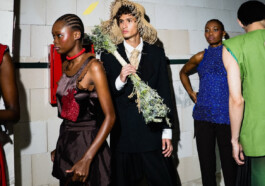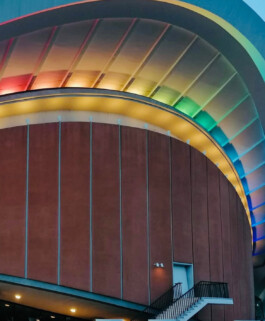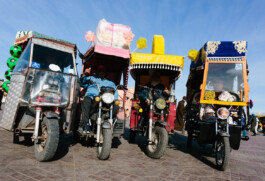
TRIBUNE LOTFI AOULAD | FEBRUARY 2025
Berlin, Fashion lab for a European Cultural Model
There are some cities that you choose. Others that choose you. And then there is Berlin.
Berlin took me by surprise on a grey winter of 2023. At the time, I was coordinating the UNESCO report on Africa, fashion industry. I was fascinated by the creative dynamics of this continent and was eager to discover a European fashion scene off the beaten path, away from Paris our Milan. I had studied German in middle and high school and even though we spoke arabic or spanish at home … this language had remained somewhere in the back of my mind. The Berlin Fashion Week was starting in two weeks To hell with the grey skies, I booked my tickets!
Berlin came to me as an answer. I was expecting eccentric fashion shows in abandoned bunkers. What I found was a city. Berlin thinks with its body, tells its story through its fringes, and constantly invents new ways of creating, far from the injunctions of performance. In the ateliers, squats, galleries, independent showrooms or streets, I discovered fashion(s). Buki Akomolafe, Buzigahill, Ghmb, Marie Lueder, Marke, Orange Culture, Sia Arnika, Société Angelique and many others. Designers, many of whom came from various diasporas, stories of exile, joy, healing and encounters. As a boy from the suburbs, part of the Franco Moroccan diaspora, searching for a cultural space where I could exist, I felt like a Berliner. Perhaps in the manner of Kennedy, but in a cosy little bar in Neukölln.
An indispensable creative epicentre for Europe
Berlin is a somatic city. I felt present there. Berlin carries within it the scars of History, the fractures of war, and the desire to rebuild itself. It has been the black heart of the world, but also the place of its contestation. From the forgotten figures of the queer scene of the interwar years to the so-called “degenerate” artists banned by the Nazi regime, from Jewish poets creating in secrecy to the feminist and anti-capitalist squats after the fall of the Wall, the city has been a refuge—now more fragile—for those who resist by creating. Exemption from military service, affordable rents, vacant buildings: everything aligned. In the 1990s and 2000s, Berlin became the most influential electronic scene in the world. Then a capital of “doing things differently”: open-source, queer, ecological. Even today, exiled artists and collectives, particularly from the diasporas, such as SAVVY Contemporary or the ifa Gallery, still embody these plural cultural scenes.
Berlin for a new germination
Artists are running out of strength. That is because the traditional models of cultural production are exhausting. Artists are
forced to be everything at once: creators, managers, content strategists, communicators, funding experts. Their art works become mere products. Their careers, brands. Their creations, commissions. In the face of the acceleration of crises, culture can no longer be just entertainment. For it is our matrix. What holds us upright. What connects us. What shapes tomorrow. Berlin remains a refuge, but a fragile one. Rents are rising, artistic wastelands are becoming scarce, the independent scene is weakening. Yet, an energy persists. For Berlin is a city where to heal is to succeed. It is no wonder that artists and other thinkers come here to breathe. In Berlin, creation is not (yet) industrialised. It is made possible.
Das Relais: a place for connection
It is in this spirit that Das Relais is being developed: a translocal and transdisciplinary space, deeply rooted in cultural narratives and well-being. Das Relais weaves bridges between visual arts, fashion, design, dance, education, parenthood, diasporic heritages, and more. Between Berlin, London, Milan, Paris, Toulouse and Clichy-sous-Bois. Between body and idea. Das Relais is being built alongside partners such as Haus der Kulturen der Welt (Berlin), the ifa Gallery (Berlin), the Africa Centre (London), and Ateliers Médicis (Clichy-sous-Bois).
Berlin is the starting point, because it embodies this need. It is the city of memories and new beginnings. Europe needs new narratives: grounded, diverse, restorative. And it is from here, from Berlin, that we want them to radiate.

CHILDREN'S WORKS @LERELAIS FESTIVAL 2018
SHARE THIS ARTICLE
ABOUT LOTFI AOULAD
Formerly a lawyer and then a public policy advisor, his journey has been shaped by a desire to inhabit different worlds: from the suburbs of Saint-Denis to international institutions, self-managed rural communities, as well as hospital and prison settings.
In 2024, he became a certified birth doula after a year-long training at the Maternité des Lilas.
He serves on the board of the association Rêv'Elles. He was also co-director of Nejma, a journal of Mediterranean literature, and supports several initiatives in the arts and fashion sectors. He is a member of the expert committee for the Arab World Fashion Prize.
RELATED ARTICLES

WELL BEING LOTFI ALOUAD | FEBRUARY 25
Diaspora Wonderland :
An emotional journey through Afro-Mediterranean narratives

TRIBUNE LOTFI AOULAD | FEBRUARY 2025
Berlin, Fashion lab for a European Cultural Model
There are some cities that you choose. Others that choose you. And then there is Berlin.
Berlin took me by surprise on a grey winter of 2023. At the time, I was coordinating the UNESCO report on Africa, fashion industry. I was fascinated by the creative dynamics of this continent and was eager to discover a European fashion scene off the beaten path, away from Paris our Milan. I had studied German in middle and high school and even though we spoke arabic or spanish at home … this language had remained somewhere in the back of my mind. The Berlin Fashion Week was starting in two weeks To hell with the grey skies, I booked my tickets!
Berlin came to me as an answer. I was expecting eccentric fashion shows in abandoned bunkers. What I found was a city. Berlin thinks with its body, tells its story through its fringes, and constantly invents new ways of creating, far from the injunctions of performance. In the ateliers, squats, galleries, independent showrooms or streets, I discovered fashion(s). Buki Akomolafe, Buzigahill, Ghmb, Marie Lueder, Marke, Orange Culture, Sia Arnika, Société Angelique and many others. Designers, many of whom came from various diasporas, stories of exile, joy, healing and encounters. As a boy from the suburbs, part of the Franco Moroccan diaspora, searching for a cultural space where I could exist, I felt like a Berliner. Perhaps in the manner of Kennedy, but in a cosy little bar in Neukölln.
An indispensable creative epicentre for Europe
Berlin is a somatic city. I felt present there. Berlin carries within it the scars of History, the fractures of war, and the desire to rebuild itself. It has been the black heart of the world, but also the place of its contestation. From the forgotten figures of the queer scene of the interwar years to the so-called “degenerate” artists banned by the Nazi regime, from Jewish poets creating in secrecy to the feminist and anti-capitalist squats after the fall of the Wall, the city has been a refuge—now more fragile—for those who resist by creating. Exemption from military service, affordable rents, vacant buildings: everything aligned. In the 1990s and 2000s, Berlin became the most influential electronic scene in the world. Then a capital of “doing things differently”: open-source, queer, ecological. Even today, exiled artists and collectives, particularly from the diasporas, such as SAVVY Contemporary or the ifa Gallery, still embody these plural cultural scenes.
Berlin for a new germination
Artists are running out of strength. That is because the traditional models of cultural production are exhausting. Artists are
forced to be everything at once: creators, managers, content strategists, communicators, funding experts. Their art works become mere products. Their careers, brands. Their creations, commissions. In the face of the acceleration of crises, culture can no longer be just entertainment. For it is our matrix. What holds us upright. What connects us. What shapes tomorrow. Berlin remains a refuge, but a fragile one. Rents are rising, artistic wastelands are becoming scarce, the independent scene is weakening. Yet, an energy persists. For Berlin is a city where to heal is to succeed. It is no wonder that artists and other thinkers come here to breathe. In Berlin, creation is not (yet) industrialised. It is made possible.
Das Relais: a place for connection
It is in this spirit that Das Relais is being developed: a translocal and transdisciplinary space, deeply rooted in cultural narratives and well-being. Das Relais weaves bridges between visual arts, fashion, design, dance, education, parenthood, diasporic heritages, and more. Between Berlin, London, Milan, Paris, Toulouse and Clichy-sous-Bois. Between body and idea. Das Relais is being built alongside partners such as Haus der Kulturen der Welt (Berlin), the ifa Gallery (Berlin), the Africa Centre (London), and Ateliers Médicis (Clichy-sous-Bois).
Berlin is the starting point, because it embodies this need. It is the city of memories and new beginnings. Europe needs new narratives: grounded, diverse, restorative. And it is from here, from Berlin, that we want them to radiate.

CHILDREN'S WORKS @LERELAIS FESTIVAL 2018
SHARE THIS ARTICLE
ABOUT LOTFI AOULAD
Formerly a lawyer and then a public policy advisor, his journey has been shaped by a desire to inhabit different worlds: from the suburbs of Saint-Denis to international institutions, self-managed rural communities, as well as hospital and prison settings.
In 2024, he became a certified birth doula after a year-long training at the Maternité des Lilas.
He serves on the board of the association Rêv'Elles. He was also co-director of Nejma, a journal of Mediterranean literature, and supports several initiatives in the arts and fashion sectors. He is a member of the expert committee for the Arab World Fashion Prize.
RELATED ARTICLES

WELL BEING LOTFI ALOUAD | FEBRUARY 25
Diaspora Wonderland :
An emotional journey through Afro-Mediterranean narratives
CONTACT:
FOR ALL INQUIRES PLEASE CONTACT
CONTACT@DASRELAIS.COM
DESIGN: SOLENN ROBIC
DEVELOPMENT: ACAPTCHA
© DAS RELAIS 2025
CONTACT:
FOR ALL INQUIRES PLEASE CONTACT
CONTACT@DASRELAIS.COM
DESIGN: SOLENN ROBIC
DEVELOPMENT: ACAPTCHA
DAS RELAIS 2025